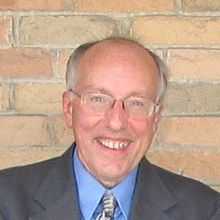Joseph Gallian
| Joseph Gallian | |
|---|---|
 | |
| Born |
January 5, 1942 Pennsylvania |
| Residence | Duluth, Minnesota |
| Institutions | University of Minnesota Duluth |
| Alma mater |
Slippery Rock University University of Kansas University of Notre Dame |
| Doctoral advisor | Karl Kronstein |
| Known for | REU program/Combinatorics |
| Notable awards |
Haimo Award from the Mathematical Association of America (1993) |
Joseph A. Gallian (born January 5, 1942) is an American mathematician, the Morse Alumni Distinguished University Professor of Teaching in the Department of Mathematics and Statistics at the University of Minnesota Duluth.[1][2]
Professional career
Gallian completed his Ph.D. thesis, entitled 'Two-Step Centralizers in Finite p-Groups', at the University of Notre Dame in 1971 under the supervision of Karl Kronstein.[3] He has been a professor at the University of Minnesota Duluth since 1972. In addition to teaching math classes, he has taught a Humanities course called the "The Lives and Music of the Beatles" for more than 25 years and a liberal arts course on math and sports.
Gallian has authored or edited five books (including Contemporary Abstract Algebra, Houghton Mifflin; For All Practical Purposes, W.H. Freeman (coauthor); Principles and Practices of Mathematics, Springer-Verlag; Proceedings of the Conference on Summer Undergraduate Mathematics Research Programs, Editor, American Mathematical Society; and Proceedings of the Conference on Promoting Undergraduate Research in Mathematics (editor), American Mathematical Society) and over 100 articles. He earned media attention in 1991 when he determined the methods used by Minnesota and many other states for assigning drivers' license numbers.[citation needed]
Every summer since 1977 (except for 1978), Gallian has run a Research Experience for Undergraduates (REU) program at the University of Minnesota Duluth.[4][5] The program has been funded by the University of Minnesota Duluth grants from the National Science Foundation (30+ years) and the National Security Agency (25+ years). It is one of the oldest and longest running REUs in the country. As of the end of 2011, the program has had 178 undergraduate participants and has produced more than 180 publications in main stream professional journals. More than 100 Duluth REU students have received a PhD degree.
Gallian served a 2-year term as the President of the Mathematical Association of America starting in January 2007.[1] In addition, he has been co-director of Project NExT since 1998, Associate Editor of MAA OnLine since 1997, a member of the advisory board of Math Horizons since 1993, and a member of the editorial board of the American Mathematical Monthly for 15 years.
Awards and honors
Gallian has won both the Allendoerfer and Evans awards for exposition from the Mathematical Association of America (MAA) and was the Polya lecturer for the MAA from 1999 to 2001.
His excellence in teaching earned him the Haimo Award for distinguished teaching from the MAA in 1993 and he was the Carnegie Foundation for the Advancement of Teaching Minnesota Professor of the Year in 2003.[1]
In 2011 he received the MAA's Yueh-Gin Gung and Dr. Charles Y. Hu Distinguished Service to Mathematics Award.
In 2000, Gallian was named by a Duluth newspaper as one of the "100 Great Duluthians of the 20th Century".
In 2012 he became a fellow of the American Mathematical Society.[6]
Selected publications
- Gallian, Joseph A. (2010). Contemporary Abstract Algebra, 7th edition. Belmont, CA: Brooks/Cole. ISBN 978-0-547-16509-7.
- Gallian, Joseph A. (Editor) (2010). Mathematics and Sports. Washington, DC: Mathematical Association of America. ISBN 978-0-88385-349-8.
- Gallian, Joseph A. "A dynamic survey of graph labeling". www.combinatorics.org.
References
- ↑ 1.0 1.1 1.2 "Biography of Joseph Gallian from the Mathematical Association of America". Retrieved 2010-02-18.
- ↑ "Joseph Gallian's Vita".
- ↑ "Mathematics Genealogy Project".
- ↑ "Joseph Gallian's Homepage".
- ↑ "SIAM News article about the Duluth REU".
- ↑ List of Fellows of the American Mathematical Society, retrieved 2013-01-19.
Additional reading
- Donald J. Albers & Gerald L. Alexanderson (2011) Fascinating Mathematical People: interviews and memoirs, "Joe Gallian", pp 146–64, Princeton University Press, ISBN 978-0-691-14829-8 .
|